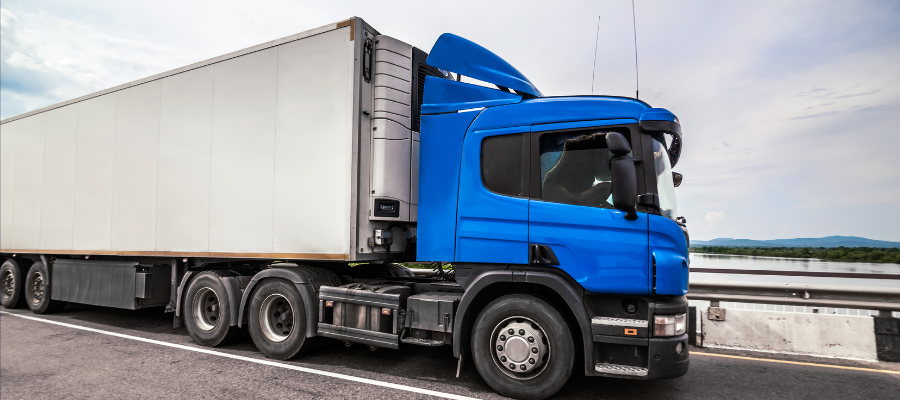🕒 Article read time: 2 minutes
The route to net zero for temperature-controlled vehicles

Modern cold chain distribution systems rely on the use of temperature-controlled transport (TCT) to move food, vaccines, medicines and other perishable goods safely, efficiently and legally.
As most refrigerated vans and lorries are powered by diesel, decarbonising these vehicles is critical to the UK achieving its target of becoming a net zero emission economy by 2050. Use of supplementary equipment, such as auxiliary transport refrigeration units (auxTRU) must also be considered; these are fitted to many HGVs used in cold chain distribution systems.
TRANSPORT REFRIGERATION UNITS
In September 2021, the Zemo Partnership (formerly Low CVP) published a report, Emissions Testing of Two Auxiliary Transport Refrigeration Units, which details the results of a Transport Scotland-funded project to measure the baseline energy consumption and emissions performance of two refrigerated commercial vehicles (two diesel auxTRU). The report showed that these cold chain systems contribute an additional 1-2% greenhouse gas emissions to current official figures reported from all the 37,000 HGV engines operating in Scotland. Commenting on the outcome of the report, Brian Robinson, Commercial Vehicle Emissions Consultant at Zemo Partnership, said: “We now need to work at pace with the cold-chain industry and government to encourage the uptake of cleaner, greener solutions.”
COLD CHAIN DETERMINED TO DECARBONISE
Fortunately, the logistics industry is united in its determination to decarbonise its operations and cold chain operations are no different, with manufacturers already leading the way in the development of zero emission transport refrigeration. London-based company Sunswap reports to have developed the “first real alternative to conventional diesel-powered systems”, with a refrigerated unit powered by solar panels and batteries. Roof-mounted solar arrays provide clean energy to run the refrigeration system, while its Adaptive Battery Capacity ensures no downtime, removing the need for fast chargers and providing sufficient energy for the most demanding journeys.
Trane Technologies offers a fully electric, zero-emission refrigeration unit for small lorries – the E-200 – designed for last-mile delivery of foods, medicines, vaccines and other perishables. it is powered by lithium-ion rechargeable battery packs and uses smart, connected technology to enhance power management, and increase uptime and fleet optimisation.
While it is inspiring to see such innovation in the development of these units, for net zero to be realised, the vehicles themselves must also be zero emission, and that is where we start to see additional challenges, particularly for heavier vehicles.
THE ROAD AHEAD
For users of HGVs, the road to decarbonisation is more complex. For lighter HGVs that travel shorter distances, the right solution may be battery electric, with some vehicles being developed already. For larger, long-haul HGVs and those that carry heavy loads, the solution is yet to be determined, with battery electric, electric road systems and hydrogen solutions all being explored. To help lower their emissions in the short term, operators are continuing to explore and invest in low-carbon fuels where possible.
While there are many steps businesses can take now to decarbonise their operations, government support and manufacturer innovation is essential. The government has committed to spending £183 million on transport decarbonisation, including trials and rollouts of hydrogen technologies for buses, HGVs, shipping and aviation. Up to £20 million has already been allocated to design trials for both electric road systems and hydrogen long-haul HGVs and to run a battery electric trial to establish the feasibility, deliverability, costs and benefits of each technology.
Michelle Gardner, Head of Public Policy at Logistics UK, said: “While industry awaits the results of the trials, uncertainty over feasible options for zero-emission HGVs remain. Logistics UK is urging the government to provide certainty on its preferred route to decarbonisation for these vehicles by the mid-2020s to make the 2050 net zero deadline possible. Furthermore, all these future fuel solutions will require substantial infrastructure investment and energy capacity.”
ROUTE TO NET ZERO CAMPAIGN
In 2021, Logistics UK launched its Route to Net Zero commitment, where it is asking its members to pledge to decarbonise their operations as quickly and as effectively as possible to help speed up the UK’s path to net zero by 2050. Commitment members now represent a vast array of companies involved in logistics across all modes and disciplines, including UPS, DHL UK, John Lewis Partnership, Wincanton, Scottish Water, and Royal Borough of Greenwich, as the sector unites to drive forward the decarbonisation of the UK economy. The business group is inviting its members within cold chain operations to apply. For more information, and details on how to apply – which involves submitting your company’s CSR/Environmental Report and completing a short application form – please visit the link below.
*www.logistics.org.uk/environment/netzero
Published On: 31/03/2022 16:00:55

Comments Section
If you are a Logistics UK member login to add comments.